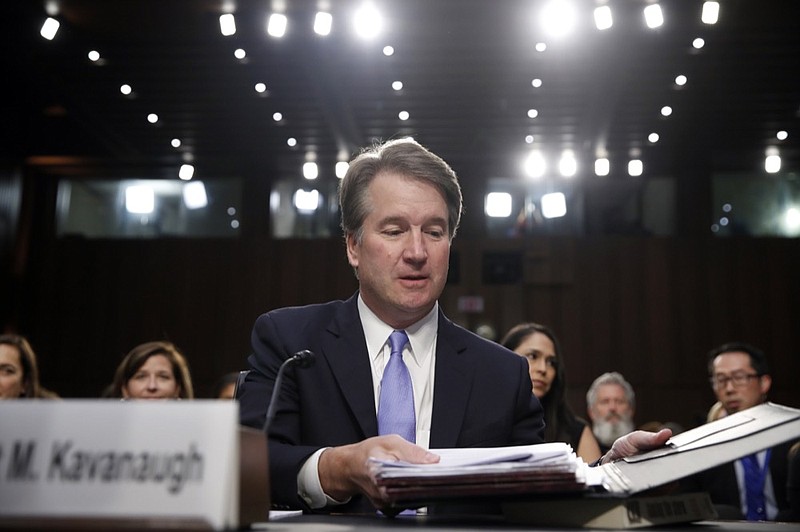No one serving in the United States Senate now, or ever, will know whether then-high school student Brett Kavanaugh attempted to assault another high school student some 35 years ago.
If the woman, Christine Blasey Ford, alleges it, and the now-U.S. Supreme Court nominee and the only other witness present deny it, where are we? Is the nominee guilty become something has been alleged? Does it matter that she's never publicly alleged such an act before? Is it important that the ranking minority member of the Senate Judiciary Committee knew about the allegation during the nominee's hearings but failed to disclose it? Should such an act so long ago, if true, disqualify an otherwise preeminently qualified nominee with no other hint of impropriety?
Those are questions the Senate Judiciary Committee will have to grapple with in a hurry this week if it plans to vote on Kavanaugh's nomination on Thursday.
The situation smacks of a desperate attempt by Senate Democrats to derail the nominee from being confirmed. Currently, if all Republicans vote for him, Democrats do not have the votes to defeat him. Most Democrats, before his hearing, said they would vote against him, not because of his qualifications but because he is more conservative than the justice he is replacing. The injection of such blatant politics in the nomination of qualified Supreme Court nominees is unprecedented in recent history, though Democrats began the process with the nomination of Judge Robert Bork by President Ronald Reagan 31 years ago.
For what's it's worth, we think the Judiciary Committee should hear the woman behind closed doors but strongly consider the context of her testimony. She says she'll testify; Kavanaugh's willing to return as well.
Ford never told anyone of the alleged incident, including her parents, until revealing information about an incident during couples counseling with her husband and a therapist in 2012. Ford gave her therapist's normally confidential notes to the left-leaning Washington Post, lending additional credence to the politics of the accusation.
The notes, apparently, don't fully agree with her public statements on the matter.
Ford also is a registered Democrat and a donor to left-wing causes. Could this have played a part - big or little - in her desire to tell her story?
And what of Sen. Dianne Feinstein, who had the information on Ford for an undetermined amount of time but certainly well before the hearings on Kavanaugh earlier this month? She and other senators grilled Kavanaugh during his hearing on a number of relevant and nonrelevant issues, one even making a fool of himself by proclaiming he'd had a "Spartacus" moment and another revealed to having perpetuated lies about the nominee.
When the hearing was done, despite the record amount of information the committee had, despite the brutal treatment he and his family were subjected to by protesters, despite the intense questioning from senators, the nominee still stood. His confirmation was all but in the books.
Then came the 35-year-old allegation of an isolated incident from high school, which discussed a laughing, bathing suit-clad teen being pinned to the bed by a drunken boy, a hand over her mouth, some fumbling with clothes, the entrance of a second drunken boy, the falling to the floor of all three parties and her escape from the room.
Such situations are not isolated with high school teenagers. That doesn't make them right or moral - even one of them - but none of us is without sin. Whatever happened, if it happened, we should be glad it went no farther than it did. What we would want to know was whether this was a pattern. Is this the type of behavior the accused person continued to be involved in? From what has been testified to about Kavanaugh, it is not.
As with many issues in Washington, though, it's one thing for parties to present testimony and for a body - a Senate, a House or a Supreme Court, for instance - to decide an issue. It's another thing when an unbiased national media always takes one side.
One national correspondent wrote a complete false statement over the weekend - that "every high-profile man accused of sexual abuse denies it and has released a list of women saying they are a good guy. And each one turned out to be an abuser." Another called Kavanaugh's denial, using additional profane language, "white supremacist patriarchy."
The whole incident reminds us of the last-minute Anita Hill allegations toward then-Supreme Court nominee Clarence Thomas in 1991. Subsequent years have shown various inconsistencies about Hill's story, her interest in Thomas (rather than vice versa) and something she said under oath that happened but about which she said five previous times did not occur.
Thomas, like Kavanaugh, had a stellar record of public service but was someone Democrats did not want on the court.
We hope both individuals in question are heard from soon but that senators and the American people understand what this tactic is and what it isn't. It isn't an heroic effort to keep a predator off the high court but an attempt by a party that would give Ted Kennedy, Bill Clinton and Al Franken a pass to keep a conservative nominee from being approved. It's as a simple as that, and we hope voters remember such efforts in November and again in 2020.
